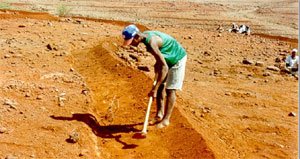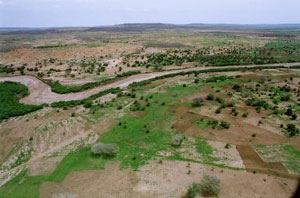Tiempo Climate Cyberlibrary
Desertification and Global Warming:
Common Action for Common Challenges
 |
Staff members of the United Nations Convention to
Combat Desertification Secretariat highlight the
critical problems and the opportunities that exist in
the urgent need to combat desertification.
|
|
The United Nations Convention to Combat
Desertification in Those Countries Experiencing
Serious Drought and/or Desertification, Particularly
in Africa is an agreement to combat desertification
and mitigate the effects of drought through national
action programmes that incorporate long-term
strategies supported by international cooperation and
partnership arrangements.
|
For years now, climate change has been recognized as a
major environmental issue and one that involves several
stakeholders. Consumers, private companies, politicians and
researchers are actively engaged in studying the processes
of how to reduce emissions and developing innovative
policies and mitigation programmes.
The people who may be the most affected by the problem
and the ones who will have to adapt are those in the South
who live on less than one dollar a day.
National Adaptation Programmes of Action are,
therefore, being planned and developed in an effort to
address this situation. Synergies and the mainstreaming of
the issues of climate change with other programmes dealing
with development and environment would considerably enhance
the efficiency of planned activities.
One of the most alarming processes of global concern,
meanwhile, is desertification
or land degradation. The recent major report of the
Millennium
Ecosystem Assessment entitled Ecosystems
and Human Well-Being underlines the fact that
desertification is one of the greatest environmental
challenges and a major impediment to meeting basic human
needs in drylands. Desertification is due to direct and
indirect human-induced factors, but it is also due to
climatic variations, including increasing droughts and
flash floods or reduced freshwater availability as a result
of global warming.
Desertification is a truly global phenomenon with
serious economic and social implications. The urgent need
to combat desertification was given recognition by the
international community at the 1992 Earth
Summit in Rio de Janeiro, Brazil. The United Nations Convention to Combat
Desertification (UNCCD) was adopted two years later as
an international legally binding instrument to address the
issue. Entering into force in 1996, the Convention now
counts 191 Parties, the largest membership of the Rio
Conventions.
While the intervening years have seen progress in
placing desertification on the international agenda, the
issue still deserves more recognition. A fact that ought to
shake people out of their inertia is the inextricable link
between desertification and poverty.
In the Millennium Ecosystem Assessment, desertification
was cited as "potentially the most threatening
ecosystem change impacting the livelihoods of the
poor." Among the two billion people living in
drylands, 90 per cent are in developing countries.
Since it is clearly not a one-dimensional environmental
issue, the fight against desertification requires a
multi-layered approach, which integrates the environmental
aspect into a broader socio-economic framework, primarily
within the development sphere. The UNCCD stands at the helm
of this process, having as its main tool the National
Action Programmes to combat desertification, which
evaluate the nature and intensity of the problem in the
respective country and identify the necessary action to be
taken.
|

|
Creating a contour
ridge to trap water run-off, Cape Verde
© UNCCD
|
The link between climate change and desertification is
of major significance. According to the Millennium
Ecosystem Assessment, dryland soils contain over a quarter
of all of the organic carbon stores in the world as well as
nearly all inorganic carbon. Due to the increased emissions
and reduced carbon sink caused by desertification and
related loss of vegetation, it is estimated that about four
per cent of total global emissions are generated in
drylands. Therefore, restoration and improvement of dryland
conditions could have a major impact on global climate
change patterns.
Climate change in turn also affects desertification,
although the exact links are not sufficiently understood
and may vary significantly from one region to another. Due
to the increase of energy in the atmosphere, however, it is
expected that the number of extreme events such as droughts
and heavy rains will increase slightly, potentially having
a dramatic impact on already weakened soils. Freshwater
availability may also be reduced, due to phenomena such as
increased solubility and salt-water intrusions induced by
the rise in sea levels.
Some studies go even further. Mike Wallace, co-author of
a recently launched study on the shift in jets streams,
said that, "if they move another two to three
degrees poleward during this century, very dry areas such
as the Sahara Desert could nudge further towards the poles,
perhaps by a few hundred miles," thereby forcing
millions of people either to migrate or to adapt to the
changing circumstances.
It is clear, therefore, that synergies between the UNCCD
National Action Programmes, which are building bridges
between development and environment policies, on the one
hand and the United Nations Framework Convention on Climate
Change National Adaptation Programmes of Action on the
other present a unique opportunity to take a new step
towards comprehensive policy instruments. This would allow
the development of innovative poverty reduction strategies,
while strengthening the adaptation capacities of the
poorest and fighting climate change through carbon
sequestration and emission reductions.
|

|
Tree planting along
crevices caused by floods, Niger
© UNCCD
|
The United Nations General Assembly designated 2006 the
International Year of
Deserts and Desertification (IYDD). The IYDD represents
a unique opportunity to raise awareness amongst the
broadest possible audience and to galvanize policy makers
and the public at large into action. It's a chance
which must be seized, given the staggeringly sobering
statistics that belie the complacency with which the issue
of desertification is often treated.
It is also a unique chance to develop synergies with
other partners in the context of global change. In other
words, collective action as an appropriate response to
collective responsibility. This is the only way forward in
seeking to put the world firmly on a path of development
that is sustainable and to address two of the most
important environmental challenges that we face in the 21st
century - desertification and climate change.
The international workshop
Climate and Land Degradation will be held December
11-15th 2006 in Arusha, Tanzania, as part of the IYDD
celebrations. The meeting is organized by the World
Meteorological Organisation in collaboration with the UNCCD
and will be a great opportunity to move forward.
Further information
External Relations and Public Information Unit, UNCCD
Secretariat, Hermann-Ehlers-Str.10, 53113 Bonn, Germany.
Fax: +49-228-8152899. Email: info@unccd.int. Web: www.unccd.int.
On the Web
A report on the International Year of Deserts and
Desertification is
available in the Tiempo Climate Cyberlibrary. The
Cyberlibrary also maintains a selected list of websites
covering drylands
and desertification.


